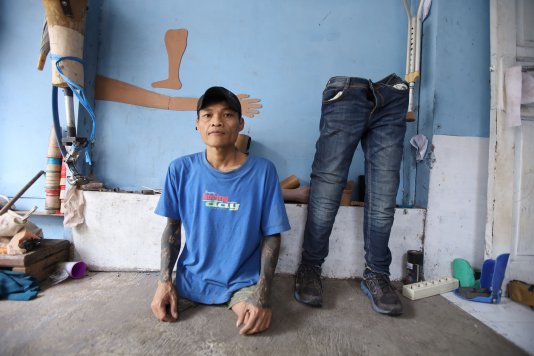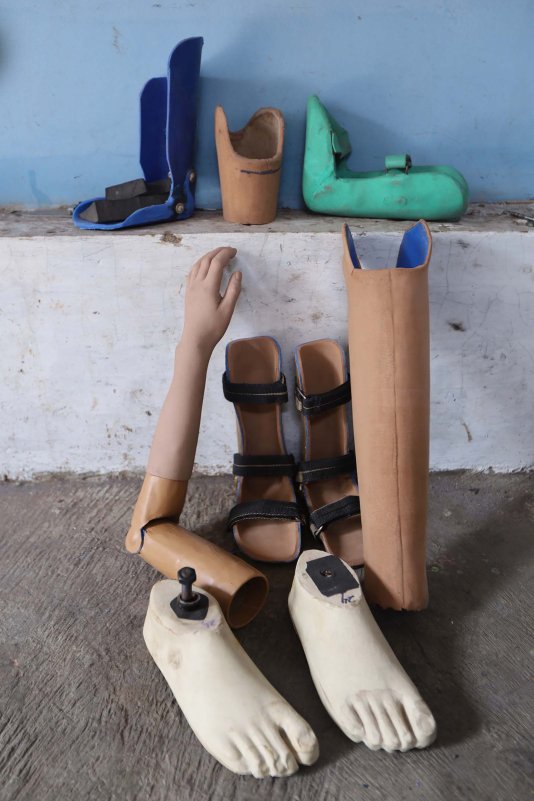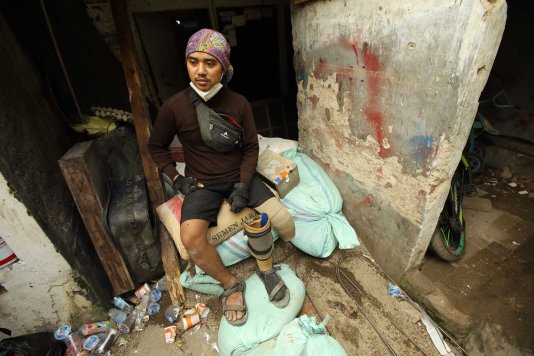- About
- Topics
- Picks
- Audio
- Story
- In-Depth
- Opinion
- News
- Donate
- Signup for our newsletterOur Editors' Best Picks.Send
Read, Debate: Engage.
| September 26, 2022 | |
|---|---|
| topic: | Discrimination |
| tags: | #Indonesia, #accessibility, #prosthetic limbs, #people with disabilities |
| located: | Indonesia |
| by: | Leo Galuh |
Dodi Supriadi, 29, was panting as he walked slowly. He took several days off from work to renovate his father’s house in Bandung, the capital of Indonesia's West Java Province. Being a low-income family, they received financial aid from the Bandung city government to renovate the house.
Supriadi said that his left knee was amputated as a result of a traffic accident in 2010 – a traumatic experience.
"I felt no hope and shame," Supriadi told FairPlanet. "I stayed at home for five months." People’s stares, he added, made him feel discriminated against.
Supriadi gained confidence after he made a prosthetic leg from iron all by himself. The materials cost 2 million IDR (USD $134). But this sum of money, he added, was taxing on his family, as he earns 300,000 IDR (USD $20) per month. His homemade prosthetic leg has also been making him sick.
"It was uncomfortable," he recalled. "My left knee was bleeding." Fortunately, in 2019 he was able to receive a free prosthetic leg crafted by a prosthetic limb maker named Indra Sumedi. Sumedi, 48, who lost both of his legs, had sent one of his team members to visit Supriadi at his home and collect data on people with disabilities (PWD) in Bandung.
Supriadi has been working as a freelancer for the last five months, creating handmade-cork airplane toys. He builds 300 airplane toys per week, earning 50,000 IDR (USD $3.3) a piece.
Nonetheless, this job alone isn't sufficient for him to support his household of four: himself, his younger sister and both of his parents.
"The most I earn per month is 300,000 IDR (USD $20)," he said.
Supriadi's new left prosthetic leg has helped him complete his work on time. He now works four to five hours per day at a package delivery company.
He admitted that finding a job for people with disabilities in Bandung is difficult. Supriadi came across a clothing stall that turned down his job application due to his disability. Furthermore, he tried to work at a factory by hiding his left knee, but was soon exposed.
"In the morning, I was working in this factory. But the management fired me in the afternoon after noticing my left knee," Supriadi said.
He grew tired of being rejected.
According to a recent International Labour Organization (ILO) report published in February 2022, only about 7 million of 17.95 million working-age people with disabilities - less than 40 percent - are employed in the formal sector in Indonesia.
The ILO notes that Indonesian regulation has allocated a quota of two percent for government’s institutions and state-owned companies, as well as a quota of one percent for commercial companies. More than 500 companies have employed more than 4,500 workers with disabilities, the ILO states, citing the Manpower Ministry.
Furthermore, Indonesia’s National Team for Accelerated Poverty Reduction (TNP2K) also found that roughly 23.3 million people in Indonesia (over nine percent of the country’s population) have a disability as of March 2019. People with disabilities, the report states, continue to face barriers in accessing basic services such as birth certificates, education, social security- including health insurance - and difficulties entering the labour market.
Indra Sumedi is a case in point. He lost both of his legs in 1998 when he was ambushed by thugs in Garut, a regency in West Java some 71 kilometers from Bandung.
Sumedi remembers being thrown at a rail and losing both legs when a train hit him.
"My life would probably not have changed if I hadn’t lost my legs," Sumedi told FairPlanet. He admitted to being "rebellious" in the past, and decided to enroll in some life-skills courses for disabled people after ten years of feeling despaired about losing his legs.
In 2010, he started a business that provides low-cost, customised prosthetic legs and arms to amputees. His customers arrive not only from Bandung, but from cities across Indonesia and Malaysia.
"I found that many people with disabilities have low self-esteem since they are discriminated against and alienated by society," Sumedi told FairPlanet.
He also discovered that the market’s prosthetic legs and arms are out of reach for low-income families, estimated the price to be somewhere between six and ten million IDR (USD $403 - $672).
Sumedi, along with five disabled and one non-disabled team members, makes prosthetic legs and arms for low-income people. He offers affordable prices or even provides them for free to those who need but cannot afford his prosthetics.
"The price ranges from two million IDR (USD $134) to three million IDR (US$ 201) for adults," Sumedi said. "The price for children’s is 700,000 IDR (USD $47)."
His products are made from resin, fiber, catalyst, sponge and water barrel plastic. It takes a day to produce a single prosthetic leg or arm, he said.
Sumedi, who is also the Vice Chairman of YKDM - a local independent NGO supporting people with disabilities, believes he bears a greater responsibility to his disabled customers. He and his team aim to form a community among his customers by sharing information about job opportunities and offering advice on how to join the National Paralympic Committee as an athlete with disabilities.
"I expect them to improve their lives after receiving my products," Sumedi said, adding that he feels like a failure when customers do not benefit from his items.
According to Fendo Parama Sardi, a program manager at the Chesire Indonesia Foundation, Indonesian people with disabilities are still stigmatised and viewed as 'charity cases.'
"However, they should be considered an equal group," Sardi told FairPlanet.
Recognising that numerous entities, including the Chesire Indonesia Foundation, are now offering job skill training to people with disabilities, he said some companies in Indonesia continue to exclude disabled individuals.
"For example, companies have no spacious area for wheelchair movement," Sardi noted.
The current disability movement, according to Sardi, is focused on empowerment, with people with disabilities fighting to have equal access to education and employment. He believes that shifting this paradigm in society will require concerted efforts from different stakeholders - a process he predicts will be lengthy.
Sardi added that the Indonesian Education Ministry should develop a curriculum in public schools that includes information about people with disabilities and how non-disabled people can collaborate with them. It will raise children's awareness of social inclusion, he added.
"When these kids become company leaders, it is expected that they will hire people with disabilities," Sardi said.
Image by Nefria Indradona.
By copying the embed code below, you agree to adhere to our republishing guidelines.


